Key points:
- My friend group did an amazing job avoiding COVID until the Omicron variants became dominant.
- For this group, a prior COVID infection appears to deliver a roughly 4x risk reduction on getting the latest variant (BA5).
- For the Omicron variant, the severity of a second infection is not that different from a first infection.
- People who've had COVID twice were much more likely to have long COVID symptoms, but the causal relationship between the two is unclear. I'm guessing that this may be partially due to other factors that influence both the chance of getting COVID again as well as the chance of getting long COVID.
Motivation
I recently got curious how much a recent prior COVID infection impacts the risk of getting the latest COVID variant (BA5). I didn't find any clear answers to this question in published research, only media articles like "Think you're safe from your prior COVID infection? Think again." and scientific reinfection studies that are a year old and not necessarily relevant to current variants. I decided that the fastest path to an answer would be to survey my broader social network on their recent experiences with COVID.
This is another attempt at what I like to call quick-and-dirty science, where I aim for (1) rapid results on current questions, and (2) results that may be specific to the demographics of my extended friend network, while sacrificing the level of rigor, peer review, and larger sample size that's associated with more formal studies. Basically, I believe that having noisy answers is better than having no answers; anything that comes out of this process with a large effect size is likely still real. I'd take a large, well-controlled study on the topic over my own work, but absent that, people are making decisions based on anecdotes (eg "my friend Donny says he got COVID twice a couple of months apart, so I should still avoid going to parties even though I got COVID last month"), and I strongly believe that quick-and-dirty survey science is way better than relying on anecdotes.
I had to make numerous small calls about whether to throw out or fix data points. (eg one person listed their second case of COVID as being in the future; another person listed their second case of COVID as coming before their first one. In general I leaned toward tossing out any data where the typo could not be unambiguously fixed relative to the rest of the data. I also had to balance survey length against expected number of responses; it's easier to get 100+ people to fill a short survey than a long one. As a result, there are plenty of useful questions I wish I could have asked but chose not to add in.
Who filled out the survey?
In general my friend group is largely based in the San Francisco Bay Area, as well as people in LA, New York, and a smattering of other locations in the US and internationally. Many work in tech, but there are people in a range of other professions as well.
In a Facebook post calling for survey responses, I encouraged people regardless of their COVID status to respond, hoping for as much of a cross-section of my friend group as possible. There were 168 responses total.
Survey respondents were generally in their late 20s to late 40s:
Almost everyone is well-vaccinated:
Also, people did a very impressive job of avoiding COVID prior to the availability of vaccines and the Omicron waves. I'm guessing this is in part because of most people taking very good precautions in the early days and in part because so many respondents have jobs that enable work-from-home.
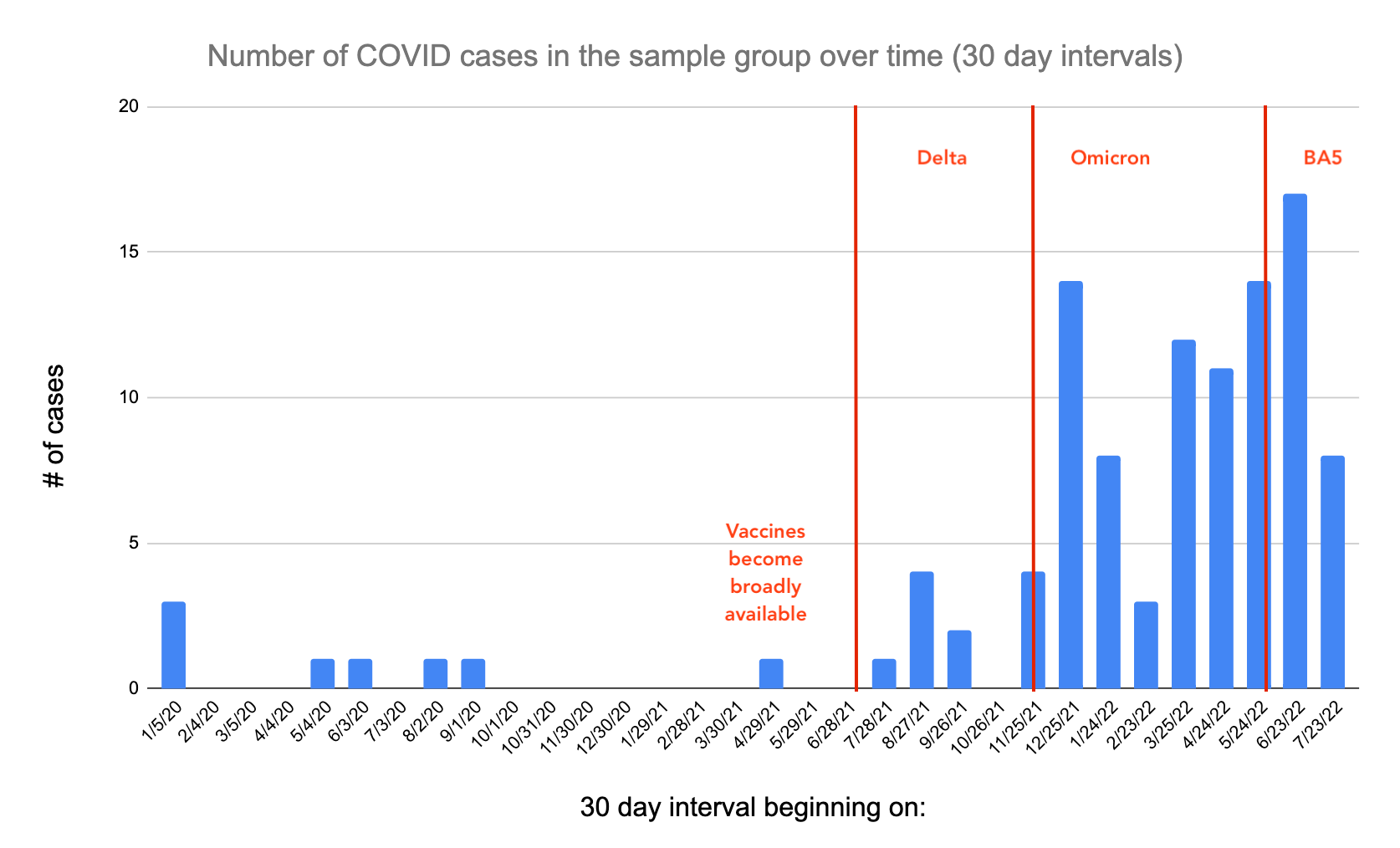
What we've learned about reinfections:
First, an astonishingly large portion of respondents (nearly half!) still haven't caught COVID. This is truly impressive. Second, there is a significant number of reinfections happening.
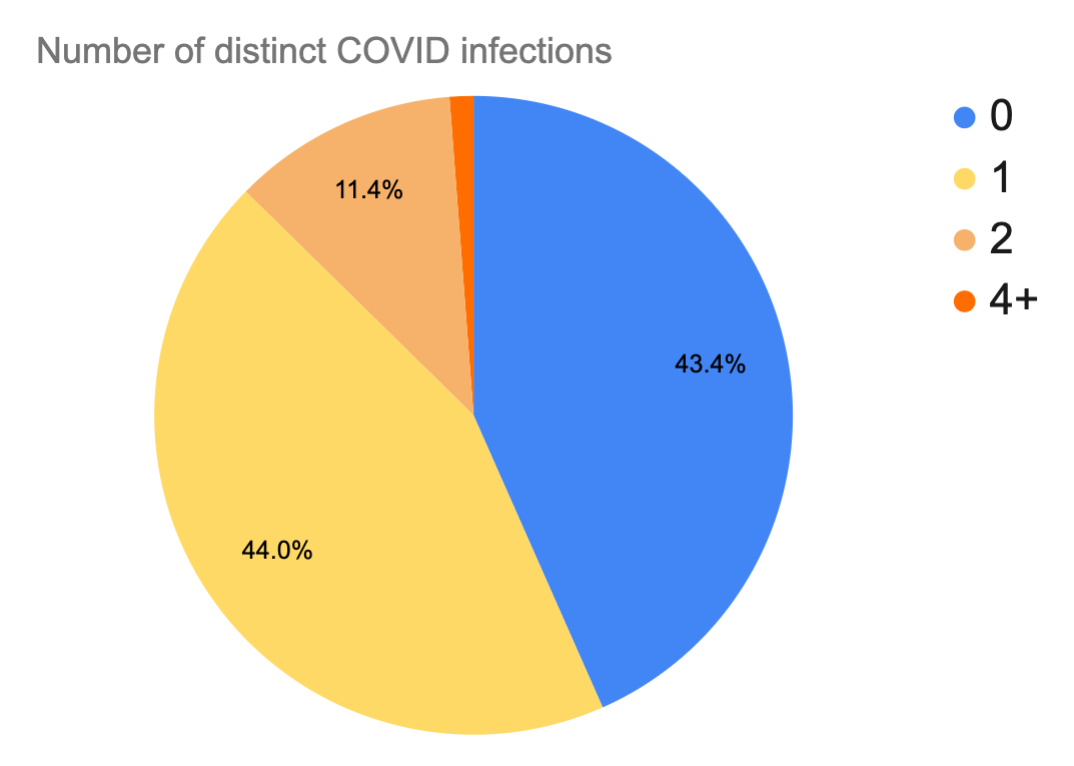
In general, it appears that people who already had COVID prior to BA5 were about 4x less likely to get COVID during the BA5 era (which started around 6/15/22).
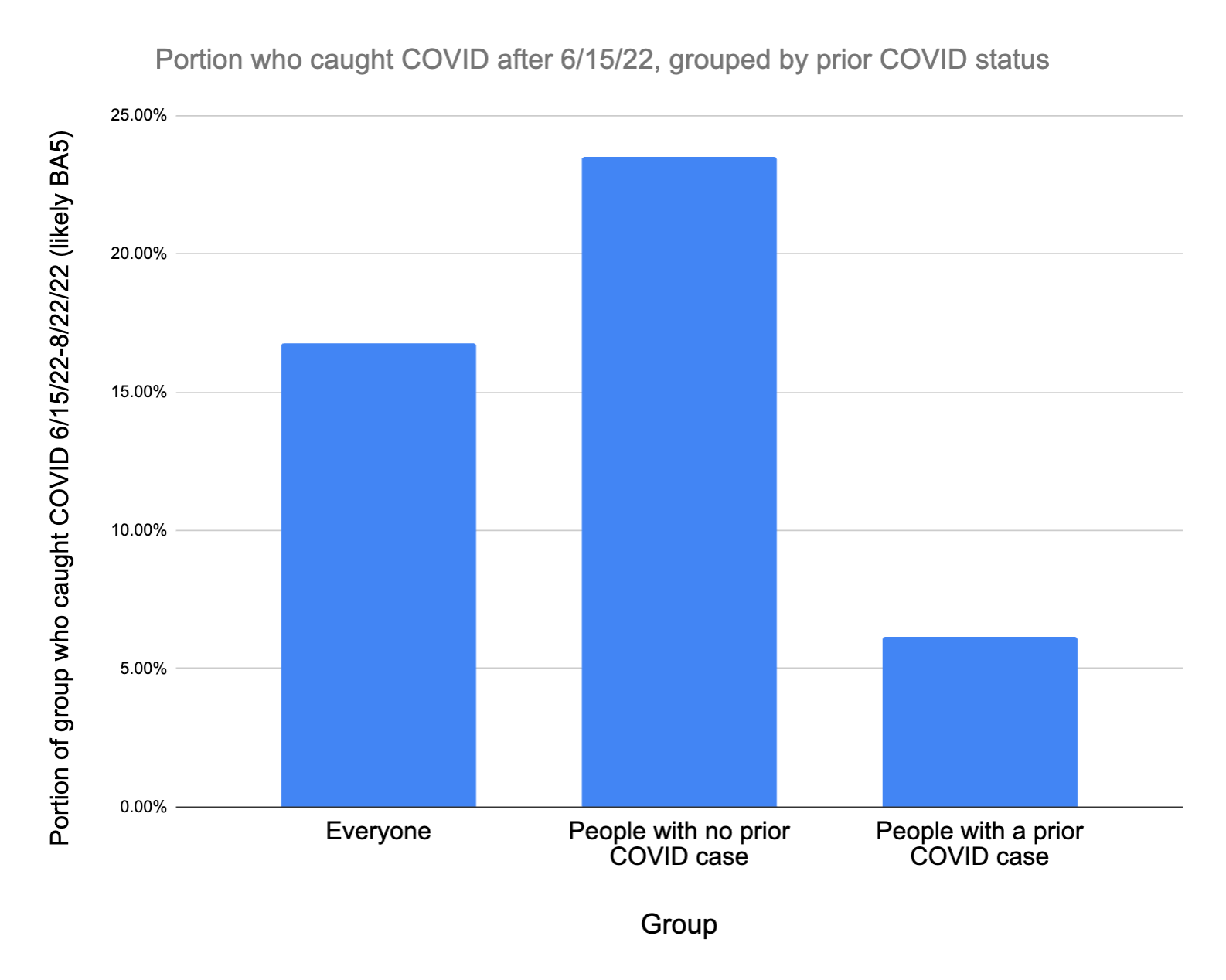
This should be good news for people who have had COVID already and are worried about catching it again. There are likely some differences in demographics and behavior between the "no prior covid case" and "prior covid case" groups, but in general the differences that likely exist strengthen the case that a prior COVID infection dramatically reduces the risk of reinfection.
Specifically, all of the following factors would a priori cause us to assume people who get COVID once are more likely to get it again, aside from the influence that an existing infection would have on immunity:
- People who've already had COVID are presumably taking fewer precautions after getting it (versus before) because of some notion of immunity.
- Some people might just be more susceptible to COVID in general (eg from a compromised immune system). Indeed we see in the results that ~16% of people who never had COVID reported an immune system condition, whereas ~21% of the people who had it once and ~29% of the people who had it twice report an immune system condition. This is despite people with immune conditions having far more reasons to take COVID precautions.
- Some people take fewer COVID precautions in general, which increases their risk to both a first COVID infection and a subsequent one.
As a result, if you assume identical demographics and behavior, it's likely that a prior case of COVID conveys even more than the 4x risk reduction we measured in terms of catching the latest BA5 variant. This should hopefully be a big relief for people who have caught COVID once and are worried about catching it again.
Here's a look at the intervals between COVID infections for those who have had it twice:
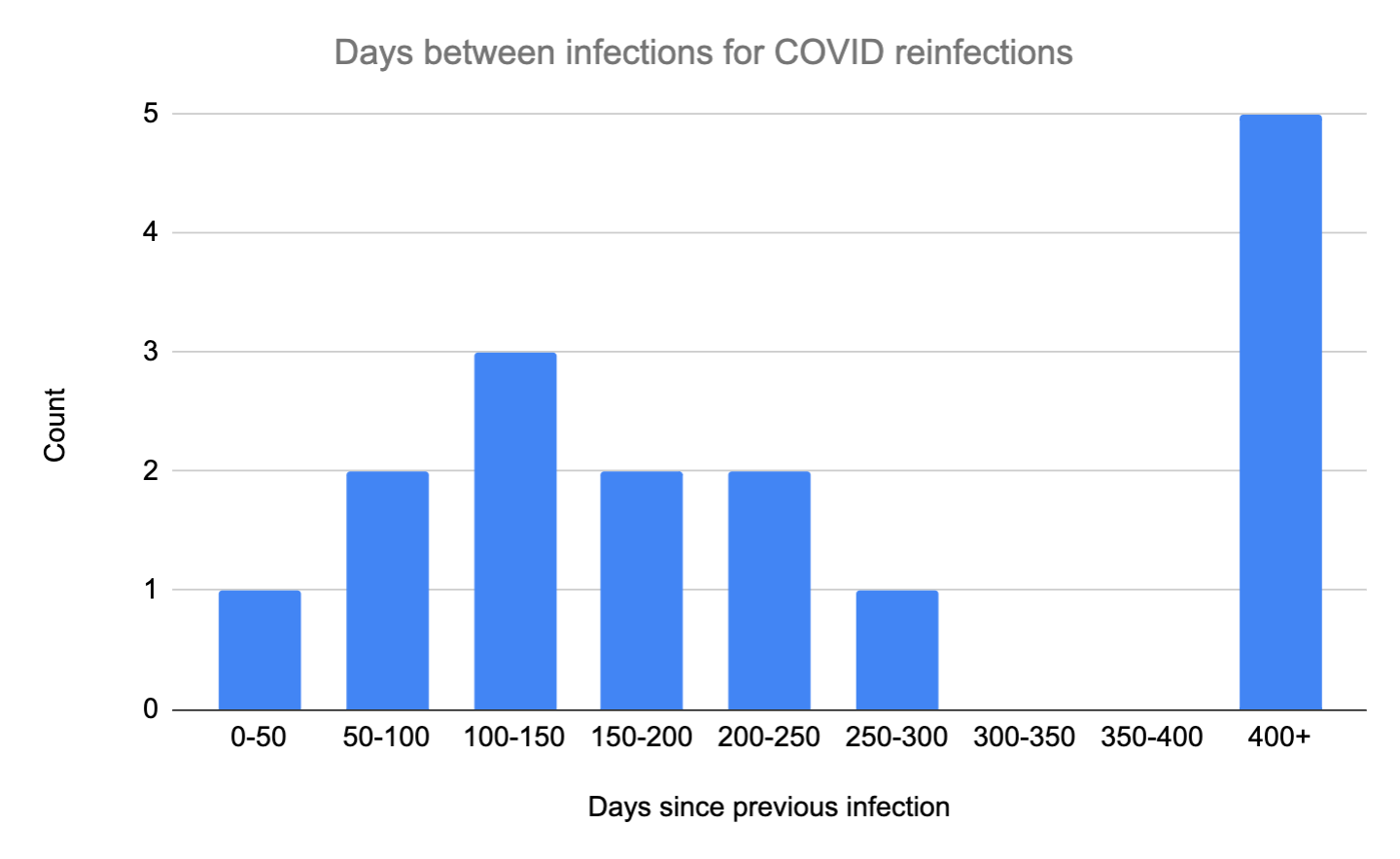
Note that this data is very heavily biased by the fact that so few people in this group caught COVID prior to the Delta wave; thus we'd expect very few people in the "400+ days" column because so few people caught COVID that long ago.
It's also interesting to know how severe reinfections are vs first-time infections. In order to have a fair comparison, we only look at reinfections during the most recent set of variants, Omicron BA1 through BA5.
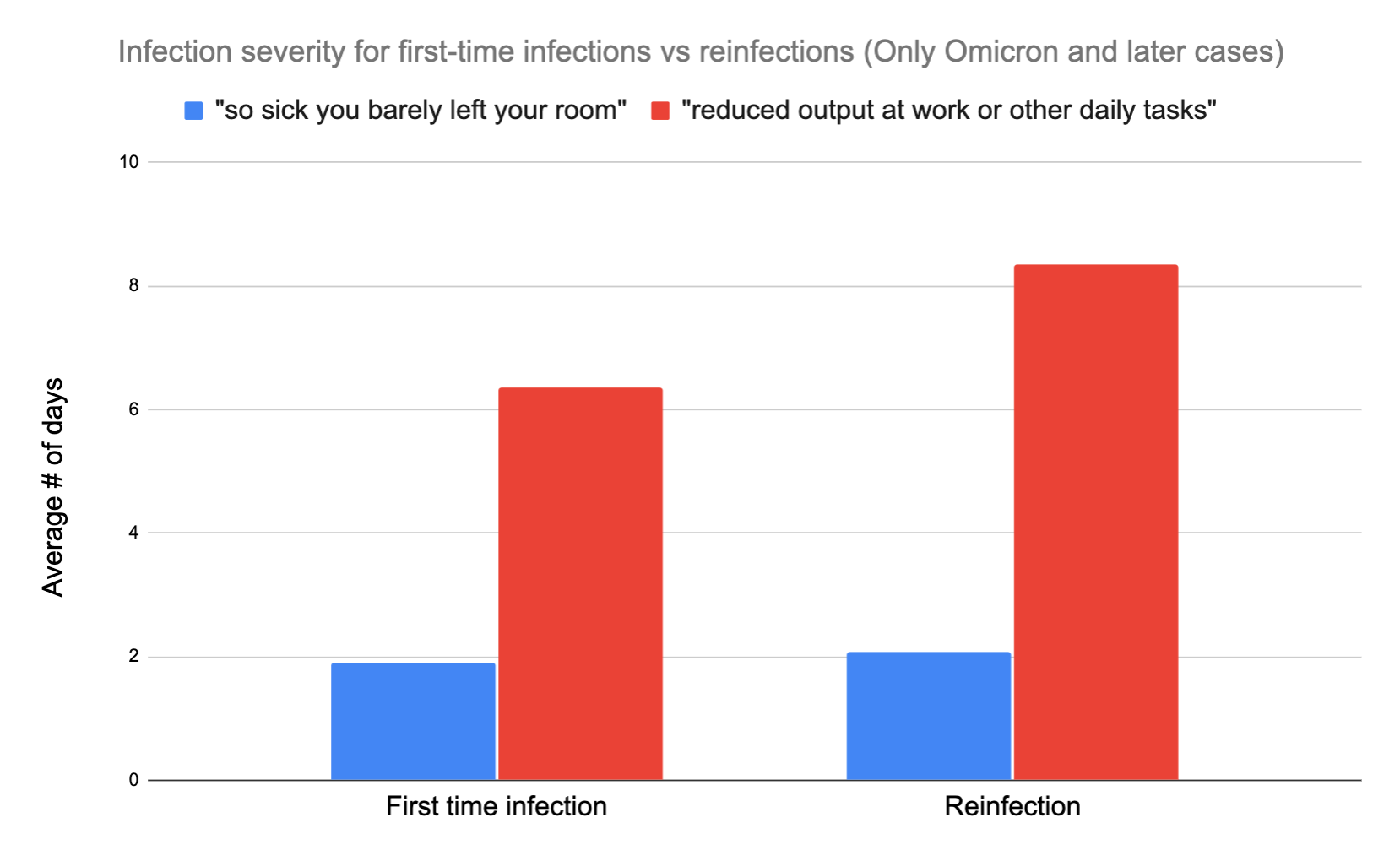
On average, reinfections appear to be slightly worse than first-time infections, though the standard deviations on severity are quite large. These results may be confounded by other factors such as people getting reinfections being more likely to have an immune condition.
Reinfections and long COVID
One big surprise is that a very large portion of the people who had reinfections reported long COVID symptoms. The question was asked as "Did you have any lingering symptoms more than 30 days after having had COVID the most recent time?". Specifically, we saw:
- 20% (14/69) of first-time infections (most of which were from an Omicron variant) reported long COVID
- 20% (12/61) of first-time infections that were from an Omicron variant reported long COVID
- 67% (10/15) of repeat infections (all cases had a most recent infection from an Omicron variant, and most had a first infection from a pre-Omicron variant) reported long COVID.
- 55% (11/20) of people who caught a pre-Omicron variant reported long COVID after their most recent COVID infection, whether it was their first or a later one.
This is a very significant difference! Unfortunately I don't have a clear picture of why. Some possibilities:
- Pre-Omicron infections were more likely to cause long COVID than Omicron infections, and a subsequent Omicron infection could re-trigger it. This seems to be supported by the data, but there are too few cases of reinfections where the first infection was Omicron to be confident in this assertion.
- There could be some factor (eg autoimmune disorders, immune-suppressing disorders, or age) that affects both the chance of getting a COVID infection as well as and the chance of getting long COVID. People who got reinfected were much more likely to report immune conditions (29% for reinfections vs 16% for people who never got COVID). However, this doesn't seem to be a big enough difference to explain the much higher rate of long COVID after reinfections on its own.
- The body is gradually accumulating damage with each COVID infection, and and each additional infection increases the risk of a chronic condition. This is the scariest possibility. However, the large, recently published study on this that's broadly quoted in the media as pointing to cumulative risk from reinfection is so out of date that it only covers infections up to 9/4/21 (Delta and earlier), and most of the reported cases are from unvaccinated people. I find this pretty frustrating, as the mainstream press is basically saying "reinfections used to be rare, now they're super common, here's a study [back from when reinfections were rare] saying that reinfections cause cumulative risk" without pointing out the fact that the data they're using to make this assertion is way out of date.
I should note that there's an interesting and large discrepancy between the portion of people with reinfections reporting long COVID symptoms (67%), and the portion of people with reinfections who reported more than 30 days or "ongoing" in terms of the period of time of "reduced output at work or other daily tasks" (12%). This might be due to differences in severity – eg a longer term loss of smell or a slightly higher resting heart rate doesn't affect your ability to get daily tasks or work done, but it nonetheless counts as a long COVID symptom.
Thanks to everyone who completed the survey! I appreciate the collective ~8 hours you all put into your responses!
